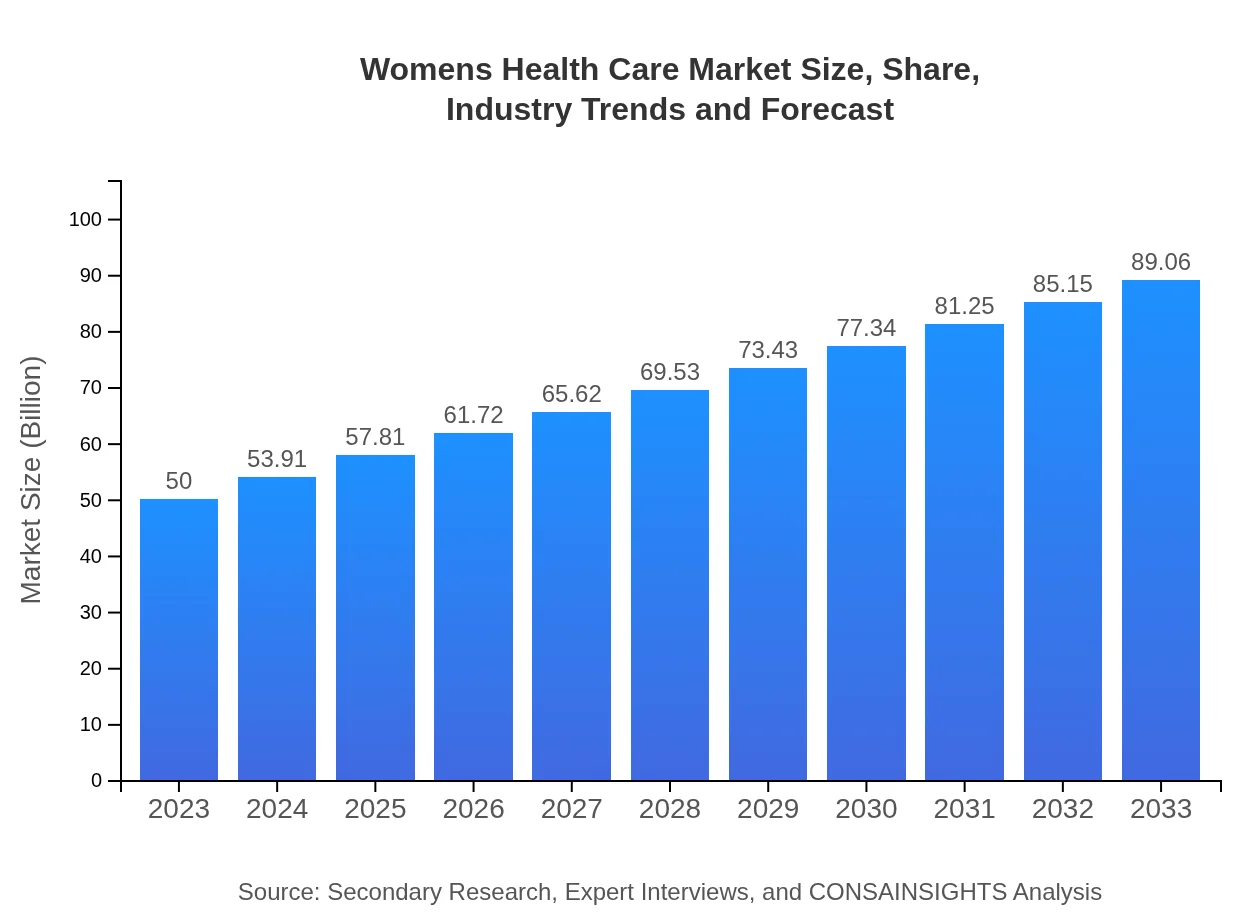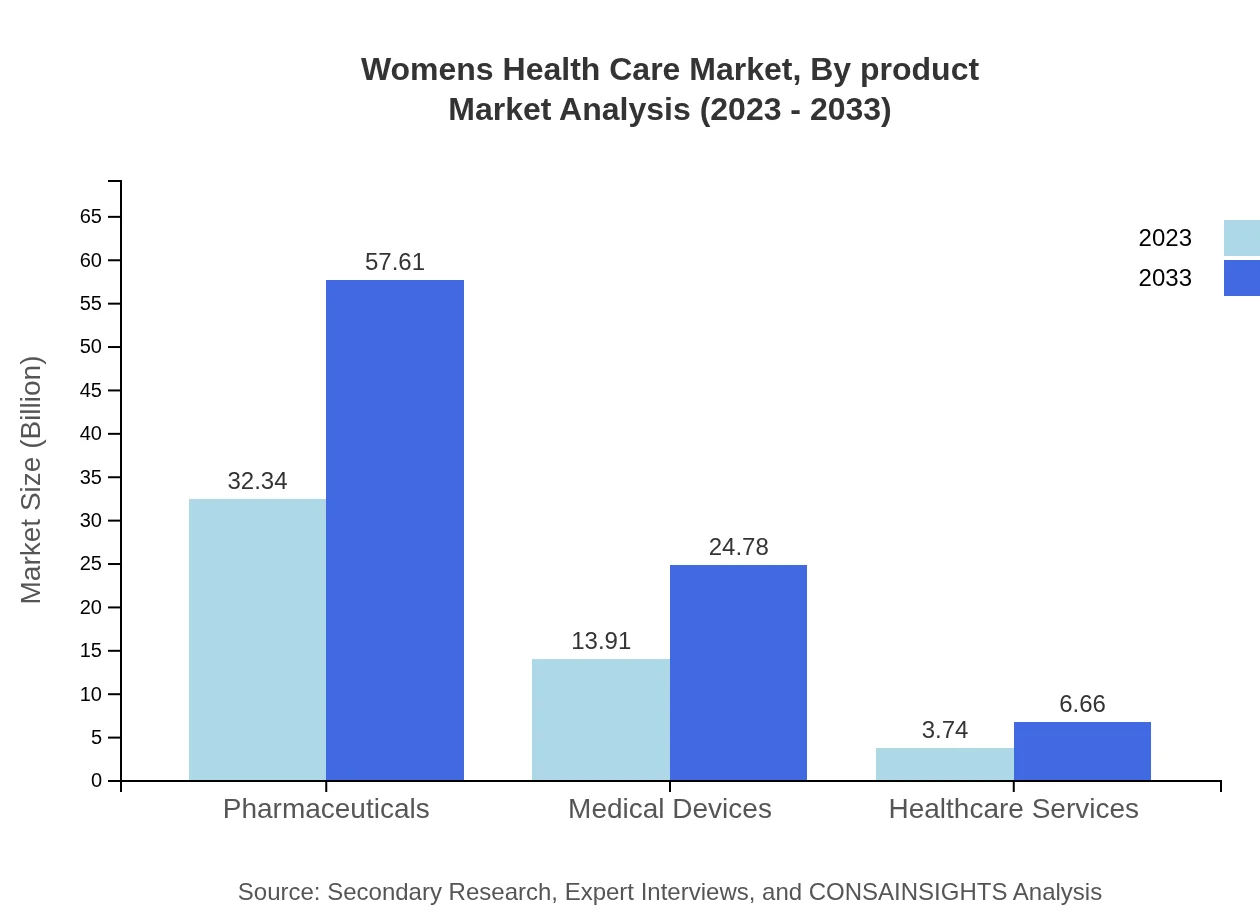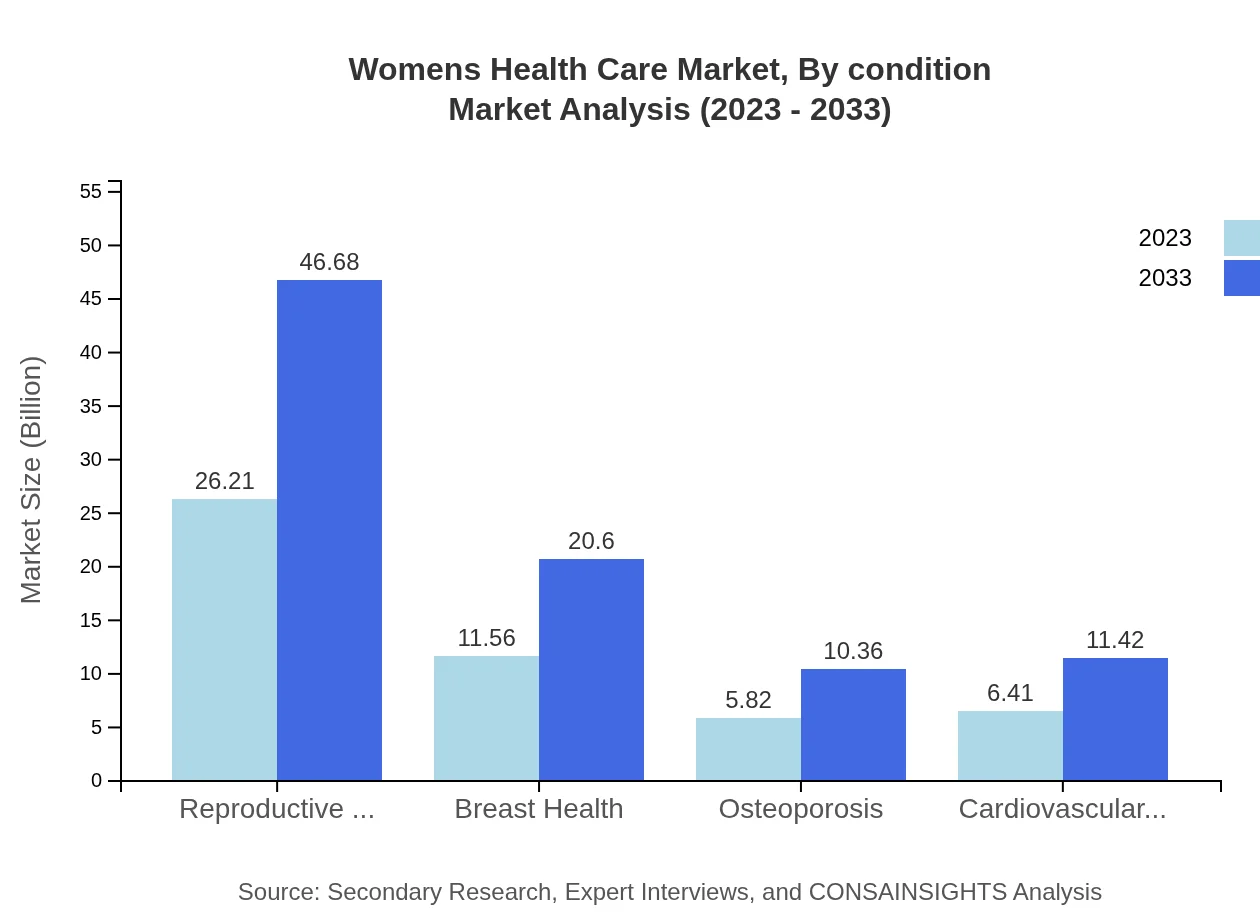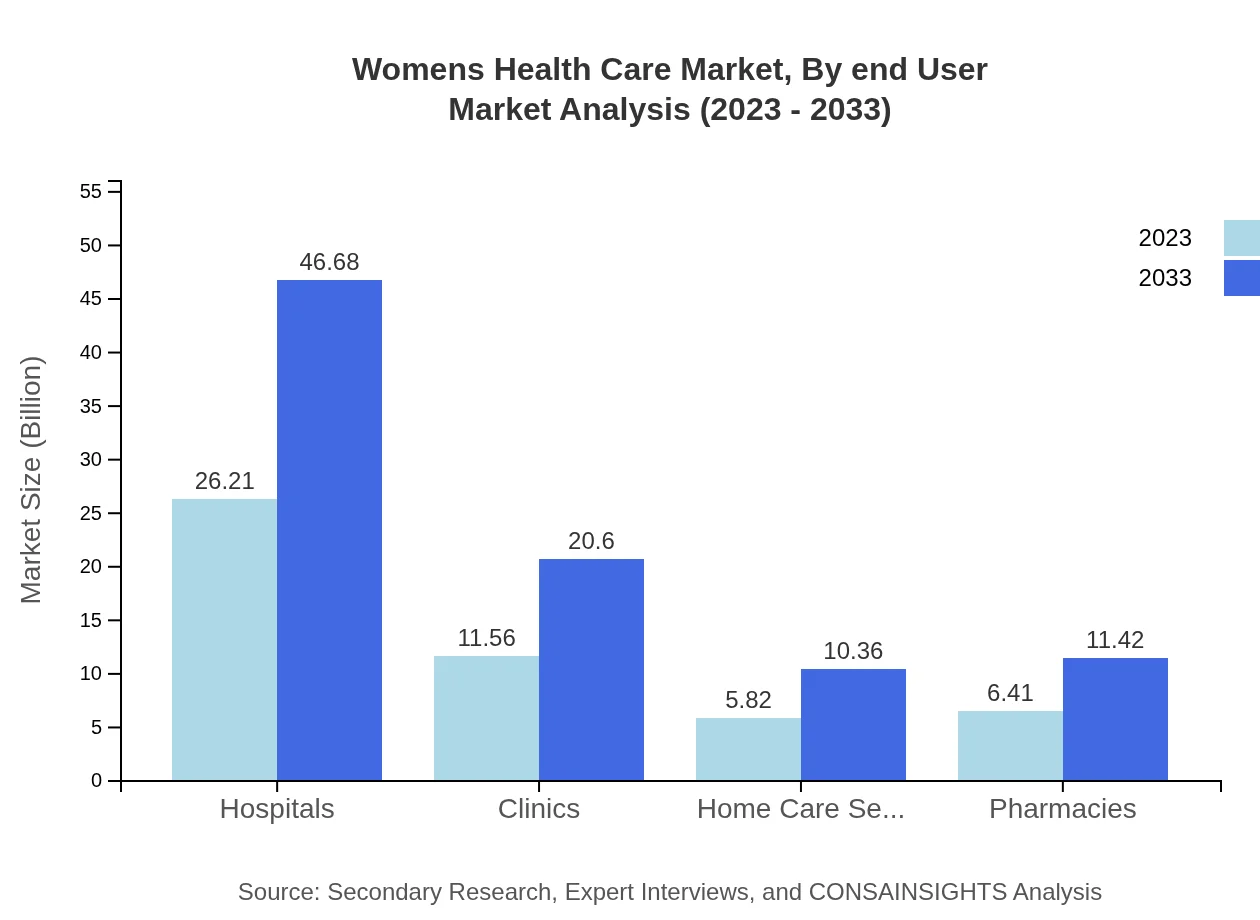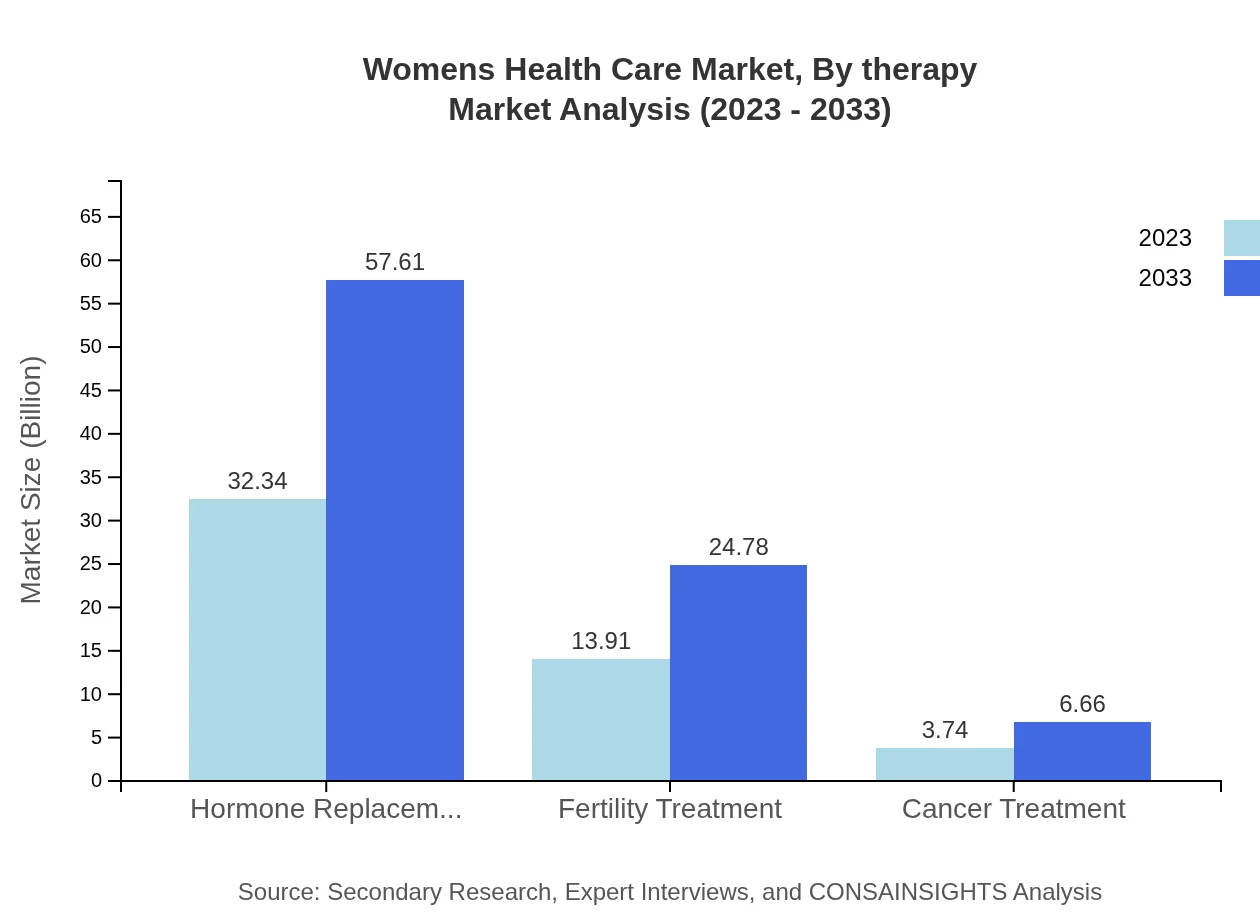Womens Health Care Market Report
Published Date: 31 January 2026 | Report Code: womens-health-care
Womens Health Care Market Size, Share, Industry Trends and Forecast to 2033
This report provides an in-depth analysis of the Women's Health Care market, showcasing insights into market size, segmentation, regional dynamics, and forecasts from 2023 to 2033, highlighting key trends and industry leaders.
| Metric | Value |
|---|---|
| Study Period | 2023 - 2033 |
| 2023 Market Size | $50.00 Billion |
| CAGR (2023-2033) | 5.8% |
| 2033 Market Size | $89.06 Billion |
| Top Companies | AbbVie Inc., Bayer AG, Merck & Co., Inc., Johnson & Johnson, Pfizer Inc. |
| Last Modified Date | 31 January 2026 |
Women's Health Care Market Overview
Customize Womens Health Care Market Report market research report
- ✔ Get in-depth analysis of Womens Health Care market size, growth, and forecasts.
- ✔ Understand Womens Health Care's regional dynamics and industry-specific trends.
- ✔ Identify potential applications, end-user demand, and growth segments in Womens Health Care
What is the Market Size & CAGR of Women's Health Care market in 2023?
Women's Health Care Industry Analysis
Women's Health Care Market Segmentation and Scope
Tell us your focus area and get a customized research report.
Women's Health Care Market Analysis Report by Region
Europe Womens Health Care Market Report:
With a current market size of $18.25 billion in 2023 projected to grow to $32.51 billion by 2033, the European Women's Health Care market is driven by an aging population, robust healthcare systems, and increasing investments in innovative health technologies.Asia Pacific Womens Health Care Market Report:
In the Asia-Pacific region, the Women's Health Care market valuation in 2023 stands at $8.26 billion and is projected to grow to $14.70 billion by 2033. Factors such as rising healthcare expenditure, increased female population awareness, and improvement in healthcare infrastructure stimulate market growth in this area.North America Womens Health Care Market Report:
North America represents one of the largest markets, expected to grow from $16.14 billion in 2023 to $28.76 billion by 2033. High healthcare spending, advancements in medical technology, and a strong emphasis on preventive care are critical to this region's market performance.South America Womens Health Care Market Report:
The South American market is valued at $3.79 billion in 2023, anticipated to increase to $6.74 billion by 2033. Economic development and increasing disposable income levels are key drivers contributing to the growth of the Women's Health Care market in this region.Middle East & Africa Womens Health Care Market Report:
The Middle East and Africa market is valued at $3.56 billion in 2023 and is expected to reach $6.35 billion by 2033. Increasing healthcare access and rising awareness of women's health issues contribute to the anticipated growth in this region.Tell us your focus area and get a customized research report.
Womens Health Care Market Analysis By Product
The Women's Health Care market by product is dominated by Pharmaceuticals, which contribute significantly with a commanding market size of $32.34 billion in 2023, growing to $57.61 billion by 2033, maintaining a market share of 64.69%. Medical Devices follow, valued at $13.91 billion in 2023 and projected to reach $24.78 billion by 2033, holding a 27.83% market share. Healthcare Services represent a smaller segment, with the size expected to grow from $3.74 billion in 2023 to $6.66 billion in 2033, maintaining a 7.48% share.
Womens Health Care Market Analysis By Condition
In terms of condition, Hormone Replacement Therapy dominates with a size of $32.34 billion in 2023, growing to $57.61 billion by 2033, reflecting a market share of 64.69%. Fertility Treatment and Cancer Treatment reach $13.91 billion and $3.74 billion in 2023, expected to rise to $24.78 billion and $6.66 billion by 2033, respectively, accommodating market shares of 27.83% and 7.48%.
Womens Health Care Market Analysis By End User
The primary end-users in the Women's Health Care market include Hospitals, Clinics, Home Care Services, and Pharmacies. Hospitals account for a significant portion with $26.21 billion in 2023, anticipated to rise to $46.68 billion by 2033 (52.42% share), followed by Clinics at $11.56 billion growing to $20.60 billion (23.13% share). Home Care Services and Pharmacies see smaller yet notable contributions with projected growth from $5.82 billion to $10.36 billion (11.63% share) and from $6.41 billion to $11.42 billion (12.82% share) respectively.
Womens Health Care Market Analysis By Therapy
Therapy options in Women's Health Care include Hormone Replacement Therapy, Fertility Treatment, Cancer Treatment, and more. Hormone Replacement Therapy significantly dominates with a market size of $32.34 billion in 2023, projected to reach $57.61 billion by 2033 (64.69% share). Fertility and Cancer Treatments follow at $13.91 billion and $3.74 billion respectively in 2023, expected to grow to $24.78 billion and $6.66 billion by 2033, maintaining shares of 27.83% and 7.48%.
Women's Health Care Market Trends and Future Forecast
Tell us your focus area and get a customized research report.
Global Market Leaders and Top Companies in Women's Health Care Industry
AbbVie Inc.:
A global biopharmaceutical company widely recognized for its focus on women's health, providing innovative medications and therapies.Bayer AG:
A major player in pharmaceuticals and consumer health products, Bayer offers a diverse range of solutions addressing women's health needs.Merck & Co., Inc.:
Known for its commitment to advancing women's health, Merck develops and markets a range of vital medications and therapies.Johnson & Johnson:
A leading health care company focusing on various segments of women's health, known for its consumer health products and medical devices.Pfizer Inc.:
A prominent player in the pharmaceutical domain, Pfizer's portfolio includes solutions tailored for women's health concerns.We're grateful to work with incredible clients.









FAQs
What is the market size of women's health care?
The women's health care market is currently valued at approximately $50 billion and is projected to grow at a CAGR of 5.8% from 2023 to 2033. This growth reflects increasing demand and advancements in women's health solutions.
What are the key market players or companies in the women's health care industry?
Key players in women's health care include major pharmaceutical companies, medical device manufacturers, and healthcare service providers, which lead in specialized solutions for reproductive health, cancer treatment, and fertility, ensuring comprehensive care for women's health issues.
What are the primary factors driving the growth in the women's health care industry?
Factors driving growth in the women's health care industry include rising awareness of women's health issues, advancements in medical technologies, increasing investment in healthcare infrastructure, and the overall trend towards personalized health care solutions tailored for women.
Which region is the fastest Growing in the women's health care market?
The fastest-growing region in women's health care is Europe, projected to expand from $18.25 billion in 2023 to $32.51 billion by 2033. Other regions such as North America and Asia Pacific also show significant growth but at a slower pace.
Does ConsaInsights provide customized market report data for the women's health care industry?
Yes, ConsaInsights offers customized market report data tailored to the women's health care industry. This can include segment analysis, regional insights, and trends, allowing clients to make informed strategic decisions.
What deliverables can I expect from this women's health care market research project?
Expect comprehensive deliverables including detailed market analysis, trend reports, competitive landscape assessments, forecasts by region and segment, and actionable insights that guide business strategies within the women's health care sector.
What are the market trends of women's health care?
Current trends in women's health care include heightened focus on telemedicine, personalized treatment options, increased investment in fertility treatments, and rising demand for preventive care services, reflecting changing consumer preferences and advances in technology.

